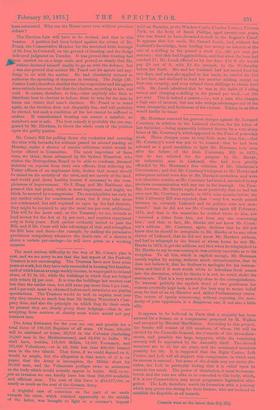Mr. Horsman reserved his gravest charges against Mr. Leonard Courtney,
in relation to the Liskeard election, for his letter of last Saturday,—being apparently irritated thereto by a very sharp letter of Mr. Courtney's, which appeared in the Times of yesterday week. Those charges come to very little more than this,—that Mr. Courtney's word was not to be trusted ; that he had been selected as a good candidate to fight Mr. Horsman, very soon after the failure of the Irish University Bill in 1873 ; that he was selected for the purpose by Mr. Hawke, an influential man in Liskeard, who had been greatly offended by Mr. Horsman's free criticism of Mr. Gladstone's Government; and that Mr. Courtney's telegram to Mr. Hawke and subsequent arrival were due to Mr. Hawke's invitation, and were not, therefore, results, as Mr. Courtney had stated, unrelated to any previous communication with any one in the borough. On Tues- day, however, Mr. Hawke replied most positively that he had but once met Mr. Courtney, namely, in 1872, nine months before the Irish University Bill was rejected, that " very few words passed between us, certainly Liskeard and its politics were not men- tioned ;" that he did not see Mr. Courtney again till February, 1874, and that in the meantime he neither wrote to him, nor "received a letter from him, nor from any one concerning him ;" and that, in fact, , Mr. Hawke did not know Mr. Court- ney's address. Mr. Courtney, again, declares that he did not know that he should be acceptable to Mr. Hawke or to any other elector of Liskeard, that he did not know Mr. Hawke's address, and had to telegraph to the friend at whose house he met Mr. Hawke in 1872, to get the address, and that when he telegraphed to Mr. Hawke to say he was coming he was entirely uncertain as to his reception. To all this, which is explicit enough, Mr. Horsman merely replies by saying, without much circumlocution, that he does not believe it, that he declines to apologise for his insinua- tions, and that if it were worth while to introduce fresh names into the discussion, which he thinks it is not, he could shake the statements. That is a very unworthy close to the correspondence. To traverse publicly the explicit word of two gentlemen for reasons avowedly kept back, is not the best way to secure belief even for that of an ex-Minister and skilful Parliamentary orator. The course of openly announcing, without exposing, the men- dacity of your opponents, is a dangerous one, if not also a little silly.


































 Previous page
Previous page